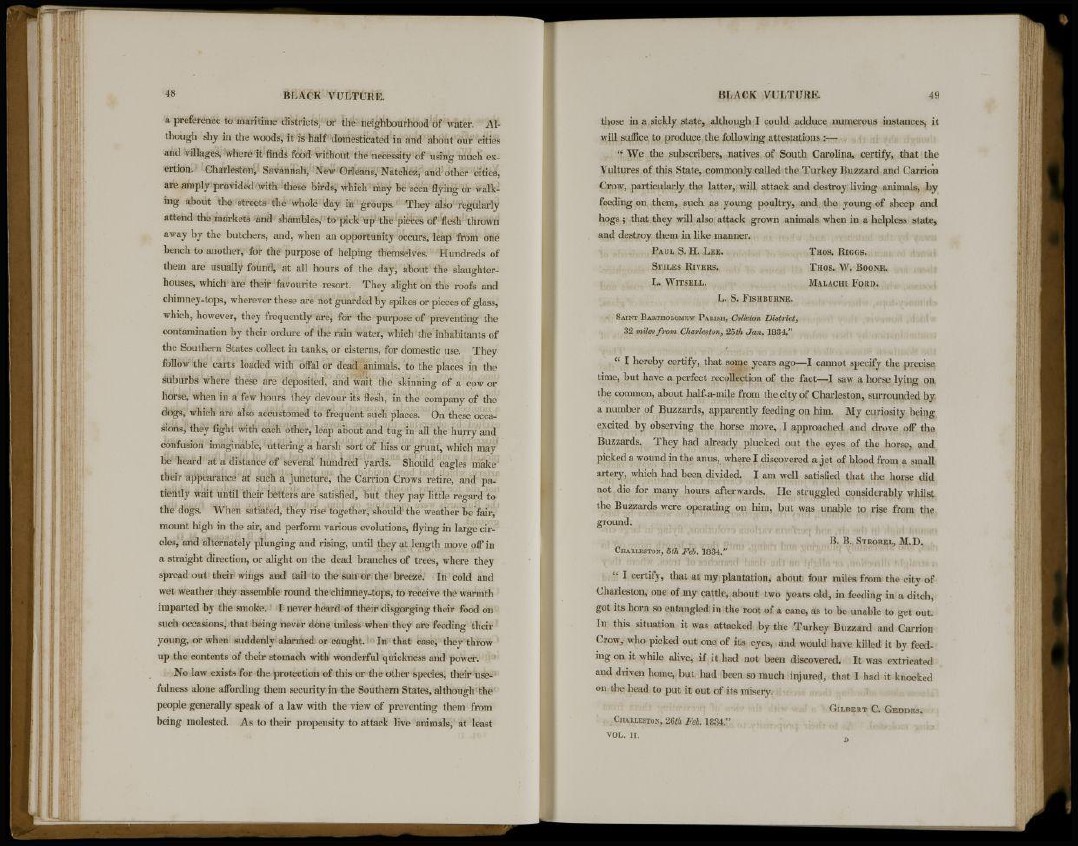
a preference to maritime districts, or the neighbourhood of water. Although
shy in the woods, it is half domesticated in and about our cities
and villages, where it finds food without the necessity of using much exertion.
Charleston, Savannah, New Orleans, Natchez, and other cities,
are amply provided with these birds, which may be seen flying or walking
about the streets the whole day in groups. They also regularly
attend the markets and shambles, to pick up the pieces of flesh thrown
away by the butchers, and, when an opportunity occurs, leap from one
bench to another, for the purpose of helping themselves. Hundreds of
them are usually found, at all hours of the day, about the slaughterhouses,
which are their favourite resort. They alight on the roofs and
chimney-tops, wherever these are not guarded by spikes or pieces of glass,
which, however, they frequently are, for the purpose of preventing the
contamination by their ordure of the rain water, which the inhabitants of
the Southern States collect in tanks, or cisterns, for domestic use. They
follow the carts loaded with offal or dead animals, to the places in the
suburbs where these are deposited, and wait the skinning of a cow or
horse, when in a few hours they devour its flesh, in the company of the
dogs, which are also accustomed to frequent such places. On these occasions,
they fight with each other, leap about and tug in all the hurry and
confusion imaginable, uttering a harsh sort of hiss or grunt, which may
be heard at a distance of several hundred yards. Should eagles make
their appearance at such a juncture, the Carrion Crows retire, and patiently
wait until their betters are satisfied, but they pay little regard to
the dogs. When satiated, they rise together, should the weather be fair,
mount high in the air, and perform various evolutions, flying in large circles,
and alternately plunging and rising, until they at length move off in
a straight direction, or alight on the dead branches of trees, where they
spread out their wings and tail to the sun or the breeze. In cold and
wet weather they assemble round the chimney-tops, to receive the warmth
imparted by the smoke. I never heard of their disgorging their food on
such occasions, that being never done unless when they are feeding their
young, or when suddenly alarmed or caught. In that case, they throw
up the contents of their stomach with wonderful quickness and power.
No law exists for the protection of this or the other species, their usefulness
alone affording them security in the Southern States, although the
people generally speak of a law with the view of preventing them from
being molested. As to their propensity to attack live animals, at least
those in a sickly state, although I could adduce numerous instances, it
will suffice to produce the following attestations :—
" We the subscribers, natives of South Carolina, certify, that the
Vultures of this State, commonly called the Turkey Buzzard and Carrion
Crow, particularly the latter, will attack and destroy living animals, by
feeding on them, such as young poultry, and the young of sheep and
hogs ; that they will also attack grown animals when in a helpless state,
and destroy them in like manner.
PAUL "S. H . LEE. THOS. RIGGS.
STILES RIVERS. THOS. W . BOONE.
L. WITSELL. MALACHI FORD.
L. S. FlSHBURNE.
• SAINT BARTHOLOMEW PARISH, Colleton District,
3 2 miles from Charleston, 25th Jan. 1834."
" I hereby certify, that some years ago—I cannot specify the precise
time, but have a perfect recollection of the fact—I saw a horse lying on
the common, about half-a-mile from the city of Charleston, surrounded by
a number of Buzzards, apparently feeding on him. My curiosity being
excited by observing the horse move, I approached and drove off the
Buzzards. They had already plucked out the eyes of the horse, and
picked a wound in the anus, where I discovered a jet of blood from a small
artery, which had been divided. I am well satisfied that the horse did
not die for many hours afterwards. He struggled considerably whilst
the Buzzards were operating on him, but was unable to rise from the
ground.
B. B. STROBEL, M . D .
CHARLESTON, 5th Feb. 1834."
" I certify, that at my plantation, about four miles from the city of
Charleston, one of my cattle, about two years old, in feeding in a ditch,
got its horn so entangled in the root of a cane, as to be unable to get out.
In this situation it was attacked by the Turkey Buzzard and Carrion
Crow, who picked out one of its eyes, and would have killed it by feeding
on it while alive, if it had not been discovered. It was extricate!
and driven home, but had been so much injured, that I had it knocked
on the head to put it out of its misery.
GILBERT C. GEDDES.
CHARLESTON, 2Gth Feb. 1834."
VOL. II. D